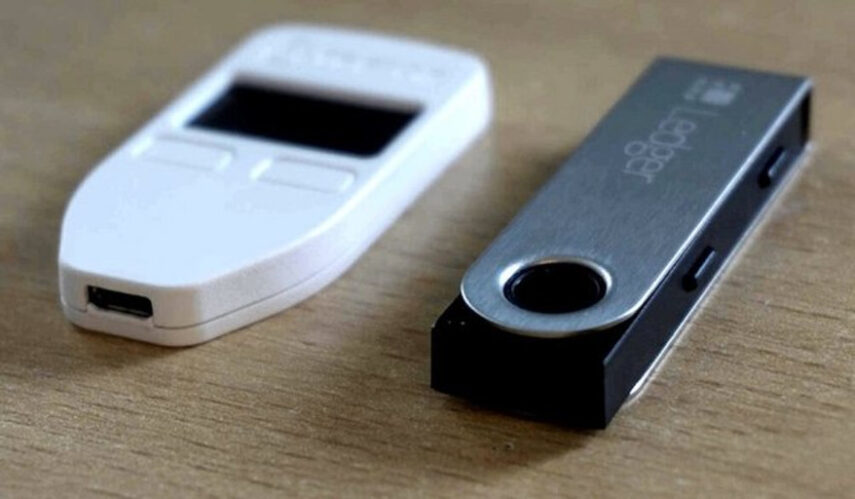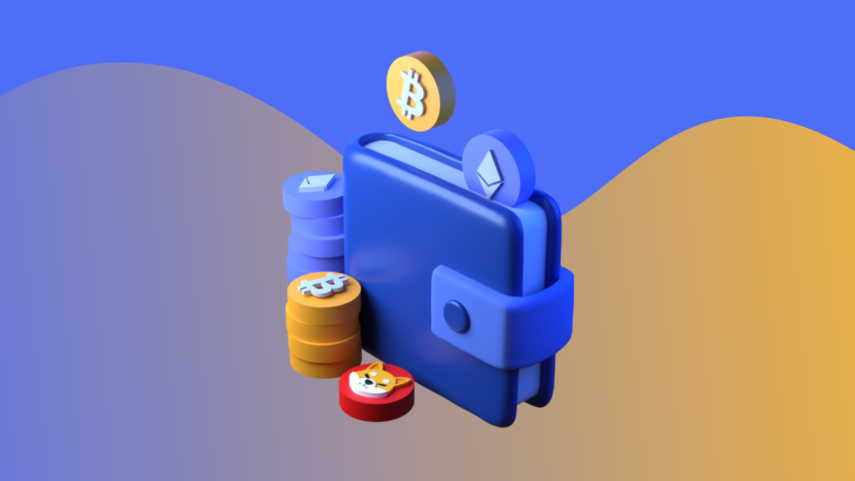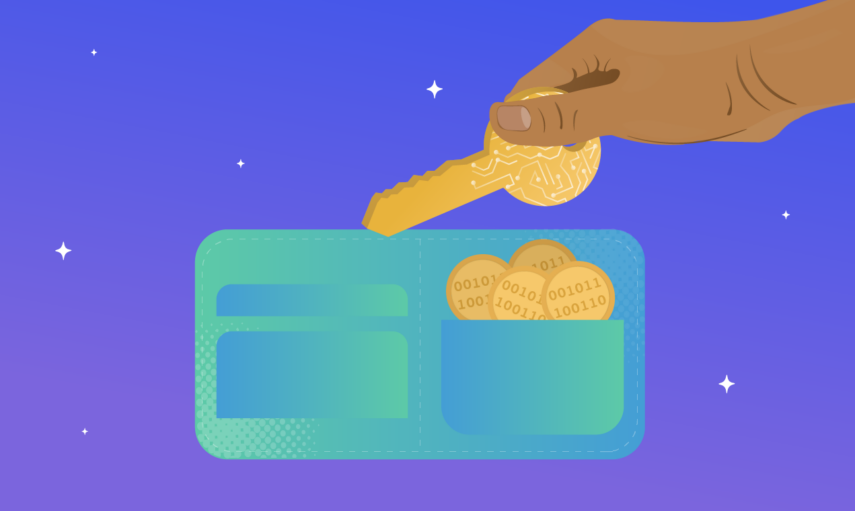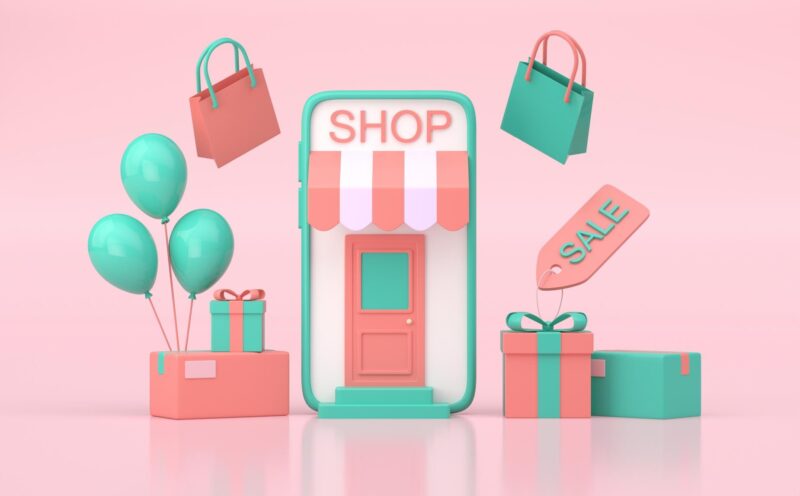Cryptocurrency wallets store users’ public and private keys while providing an easy-to-use interface to manage crypto balances. They also support cryptocurrency transfers through the blockchain. Some even allow users to perform certain actions with their crypto assets such as buying and selling or interacting with decentralized applications (dapps).
It is important to remember that cryptocurrency transactions do not represent a ‘sending’ of crypto tokens from your mobile phone to someone else’s mobile phone. When you are sending tokens, you are using your private key to sign the transaction and broadcast it to the blockchain network. The network will then include your transaction to reflect the updated balance in your address and the recipients.
So, the term is somewhat of a misnomer as they don’t store cryptocurrency in the same way physical ones hold cash. Instead, they read the public ledger to show you the balances in your addresses and also hold the private keys that enable you to make transactions.
How Do Cryptocurrency Wallets Work?
As mentioned earlier, they don’t hold your coins. Instead, hold the key to your coins which are stored on public blockchain networks.
To perform various transactions, you’ll need to verify your address via a private key that comes in a set of specific codes. The speed and security often depend on the type that you have.
Learn more at cryptex.net.
Different Types Of Crypto Wallets
There are two main types: software-based hot wallets and physical cold wallets. Read on to learn about the different types, and which is best for you and your needs.
Hot Wallets

The main difference between hot and cold is whether they are connected to the Internet. Hot wallets are connected to the Internet, while others are kept offline. This means that funds stored in hot wallets are more accessible, and are easier for hackers to gain access to.
Examples include:
- Web-based
- Mobile
- Desktop
In hot wallets, private keys are stored and encrypted on the app itself, which is kept online. Using this can be risky because computer networks have hidden vulnerabilities that can be targeted by hackers or malware programs to break into the system. Keeping large amounts in a is a fundamentally poor security practice, but the risks can be mitigated by using a hot wallet with stronger encryption, or by using devices that store private keys in a secure enclave.
There are different reasons why an investor might want their cryptocurrency holdings to be either connected or disconnected from the Internet. Because of this, it’s not uncommon for the holders to have multiple storage, including both of them.
Cold Wallets

As introduced at the beginning of this section, it is entirely offline. While they’re certainly not as convenient as the first one, they are far more secure. An example of a physical medium used for cold storage is a piece of paper or an engraved piece of metal.
Examples of cold wallets include:
- Paper
- Hardware
Custodial Wallets

Most web-based tend to be these. Typically offered on cryptocurrency exchanges, these are known for their convenience and ease of usage, and are especially popular with newcomers, as well as experienced day traders.
You can read more about them on elementalcrypto.com and see what kind of wallets suits you.
The main difference between these and the types mentioned above is that users are no longer in full control of their tokens, and the private keys needed to sign for transactions are held only by the exchange.
The implication here is that users must trust the service provider to securely store their tokens and implement strong security measures to prevent unauthorized access. These measures include two-factor authentication, email confirmation, and biometric authentication, such as facial recognition or fingerprint verification. Many exchanges will not allow you to make transactions until these security measures are properly set up by the user.
Exchanges and custodial providers will usually also take further steps to ensure the safety of users’ tokens. For example, a portion of the funds is usually transferred to the company’s cold wallet, where they can be safe from online attackers.
Non-Custodial Wallets

Non-custodial, on the other hand, allows you to retain full control of your funds since the private key is stored locally with the user.
When starting a non-custodial wallet, you will be asked to write down and safely store a list of 12 randomly generated words, known as a ‘recovery’, ‘seed’, or ‘mnemonic’ phrase. From this phrase, all of your public and private keys can be generated. This acts as a backup or a recovery mechanism in case you lose access to your device.
Anyone with the seed phrase will be able to gain full control of the funds in it. In a case scenario where the seed phrase is lost, you will lose access to your funds. So it is imperative to keep the mnemonic phrase in a secure location, and not store a digital copy of it anywhere! Do not print it out at a public printer or take a picture of it with your phone.
Note that hardware wallets are inherently non-custodial since private keys are stored on the device itself. The common theme here is that the private keys and the funds are fully in the users’ control. As the popular saying within the crypto community goes, ‘not your keys, not your coins!’
On the flip side, however, this means that users must be in charge of their security, concerning the storage of passwords and seed phrases. If any of these are lost, recovery can be difficult or impossible since they are typically not stored in any third-party server.
NFT Wallets

It is a secure place that stores non-fungible tokens (NFTs). When choosing, you have two main choices: hardware or software-based.
What Should You Look For In An NFT Wallet?
The right one for you will depend on a variety of factors, including your level of experience, your security needs, and the types of tokens you plan on storing. Here are some things to consider when choosing it:
- Compatibility with NFT marketplaces – You need a wallet that can integrate with the NFT marketplaces you want to buy from
- Strong security – Such as two-factor authentication
- User-friendly interface – A good NFT wallet should be user-friendly and easy to set up
- Accessible on multiple devices – Most are available either as web extensions or as mobile or desktop applications. For enhanced convenience, look for the one that’s available on multiple devices and can synchronize transactions in real-time
- Cross-chain compatibility – Most support Ethereum-based tokens, however, if you want to mint, buy, and sell tokens on other networks, then you will need a wallet with cross-chain compatibility
Popular hardware wallets include devices by Ledger and Trezor. However, as NFTs are not natively supported by either of these, you will need to connect your hardware wallet to a hot wallet that’s capable of storing and managing NFTs.
As storing large quantities of coins in a single wallet is quite risky, a combination of cold and hot wallets is usually ideal, and can help you strike the right balance between convenience and security.
Related Posts:
- Whether there will be Season 2 or not: No Game No Life
- Is there any Difference Between Mac And PC Bitcoin Mining?
- Are There Advantages to Owning a Luxury Vehicle?
- 5 Major Cryptocurrencies Traded in the Market Actively
- How Online Casinos Are Adopting Cryptocurrencies -…
- 3 Reasons Why Casinos Are Not Accepting Some…







